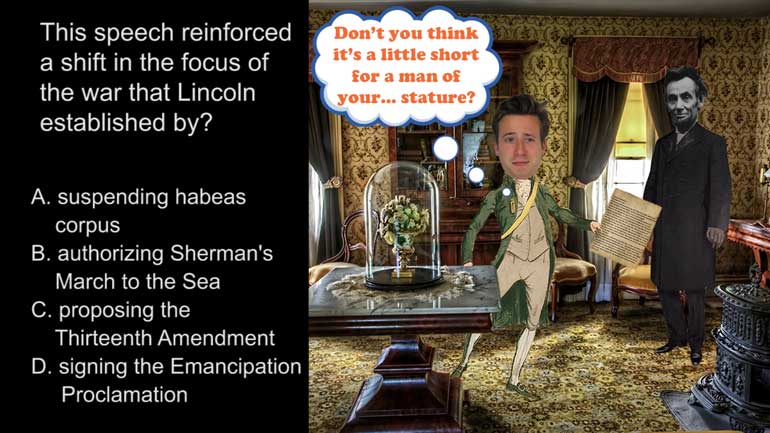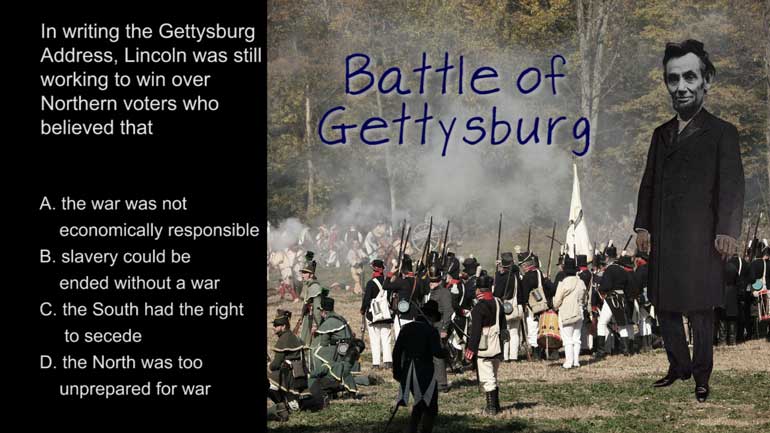ShmoopTube
Where Monty Python meets your 10th grade teacher.
Search Thousands of Shmoop Videos
AP U.S. History 1.1 Period 5: 1848-1877 354 Views
Share It!
Description:
AP U.S. History 1.1 Period 5: 1848-1877. Which of the following groups would be most likely to support the idea of Manifest Destiny?
Transcript
- 00:00
[ musical flourish ]
- 00:03
And here's your Shmoop du jour, brought to you by the scientific method,
- 00:07
the process nerds use to get girls to like 'em.
- 00:10
Heh heh. We know.
- 00:11
That's what I used in high school.
Full Transcript
- 00:14
It didn't really work, though.
- 00:16
[ sobbing ]
- 00:21
All right, well, here. Read the excerpt.
- 00:22
[ mumbles ]
- 00:24
[ mumbling continues ]
- 00:30
All right, and now the question.
- 00:31
Did I say that out loud?
- 00:33
All right, the language used in the excerpt most strongly supports
- 00:36
which of the following ideas?
- 00:37
And here are your potential answers.
- 00:39
[ meow ]
- 00:41
All right.
- 00:42
Let's check out the language in this excerpt.
- 00:44
Truman says the greatest achievement in science was
- 00:47
putting together infinitely complex
- 00:49
pieces of knowledge held by men
- 00:52
in different fields.
- 00:54
Sounds like Harry S. was pretty amped about all the
- 00:56
great scientific progress happening around him.
- 00:59
Let's see which answer best matches
- 01:01
his level of excitement.
- 01:03
Does the language in the excerpt support
- 01:05
A - Manifest Destiny?
- 01:08
Hmm. Well, at this point, the American frontier
- 01:09
was considered closed. So Manifest Destiny was no longer relevant.
- 01:13
That eliminates A.
- 01:14
Would this language have supported B -
- 01:16
military interventionism?
- 01:19
Well, while U.S. participation in World War II
- 01:22
was certainly an example of military interventionism,
- 01:25
this quote specifically deals with science
- 01:27
and technology, not Truman's foreign policy.
- 01:30
So that knocks out B.
- 01:32
Does the language support
- 01:33
C - disillusionment?
- 01:35
In the speech, Truman marvels
- 01:37
at the achievement of scientific brains.
- 01:39
So he's pretty excited about the technological progress,
- 01:42
not disillusioned. So C is a no-go, too.
- 01:45
That means the language in the excerpt
- 01:47
most strongly supports D -
- 01:49
scientific modernism.
- 01:52
People who believed in scientific modernism
- 01:54
relied on the scientific method,
- 01:56
the idea that hypotheses can be tested
- 01:58
based on evidence and impartial
- 02:00
observation. This way of thinking
- 02:02
led to breakthrough technologies, including
- 02:04
the atomic bomb, which both amazed and horrified
- 02:08
the world. So D is the right answer.
- 02:10
These scientific advancements also challenged religious beliefs
- 02:13
and people started to question where authority came from,
- 02:16
how the world worked, and what the meaning
- 02:18
of life was.
- 02:20
You know, the easy stuff.
- 02:25
[ rumbling ]
Up Next
AP U.S. History Exam 2.45. The journey shown on the map was an example of...what?
Related Videos
AP U.S. History Exam 2.26. This speech reinforced a shift in the focus of the war that Lincoln established by...what?
What did the Spanish messengers bring with them to North America? Hint: you probably wouldn't be thrilled to get this for your next birthday.
AP U.S. History Diagnostic 24. How did the United States choose containment over the National Security Council Report in Latin America?
AP U.S. History Exam 2.25. In writing the Gettysburg Address, Lincoln was still working to win over Northern voters who believed that...what?




